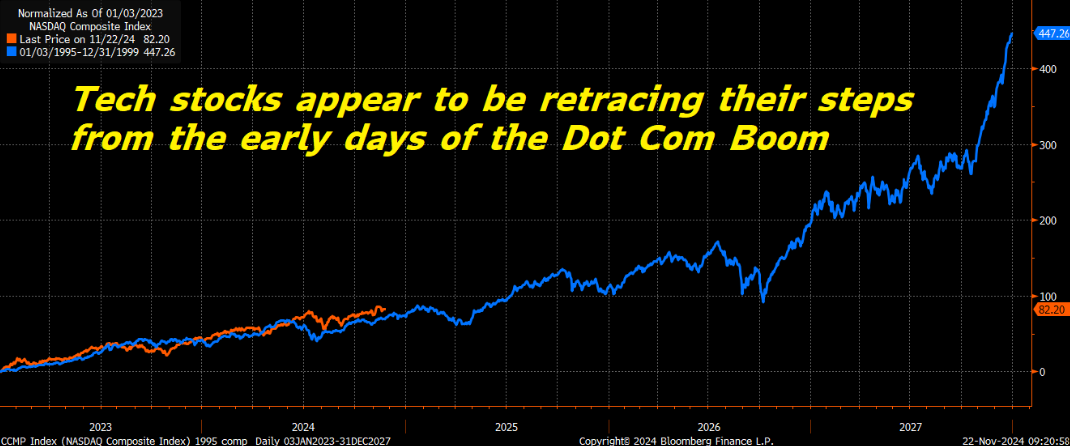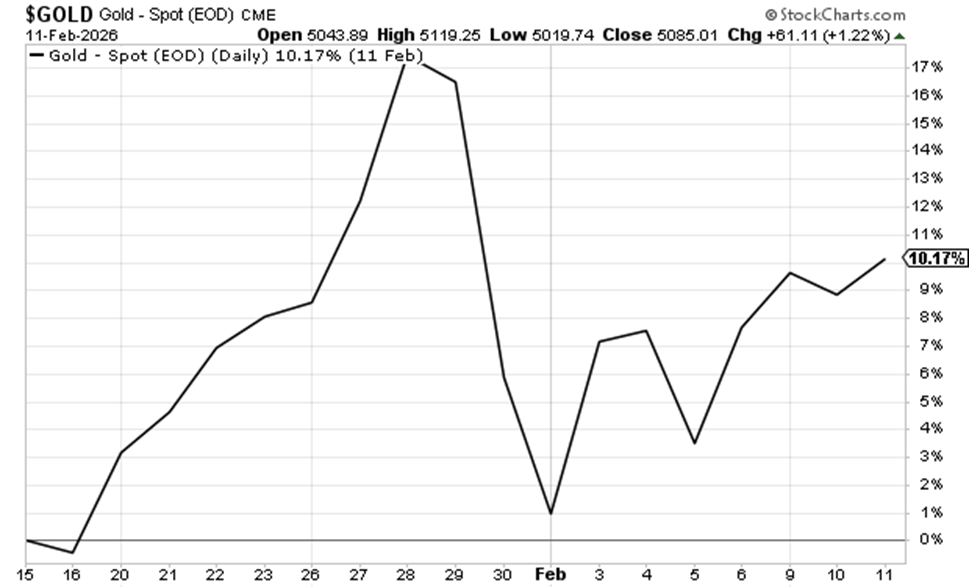AI Boom Mirrors Dot Com Era: The Next Big Gains Are Coming
The artificial intelligence revolution is reshaping the market, and companies like Nvidia (NVDA), Microsoft (MSFT), and Meta (META) are leading the charge with massive stock gains. Many investors are regretting not getting in earlier on this trend.
Could the largest increases still be ahead?
Consider this: numerous industry experts argue that current developments in AI resemble the Dot Com Boom of the late 1990s. This comparison appears to be fitting.
The internet, a transformative technology, rapidly integrated into the global economy, altering how we work and live. It fundamentally reshaped communication and connectivity. Similarly, AI is making waves, also revolutionizing various aspects of daily life.
The parallels between these two groundbreaking technologies extend beyond just their impacts on society. They also reflect the trends seen in their respective financial markets.
Comparing AI and the Internet: A Financial Perspective
This year, 2023, marks an impressive start for the AI Boom, with the S&P 500 increasing by over 20%. The trend continued into 2024, as the index saw another 20% rise. This consecutive growth hasn’t been seen since the early days of the Dot Com Boom in 1995 and 1996.
Examining the S&P’s performance in the last two years alongside the 1995 and 1996 data shows a remarkable correlation.

Currently, AI stocks are following a timeline reminiscent of the Dot Com Boom. In the 1990s, the market surge occurred in phases: initially, it focused on the ‘Builders’ followed by the ‘Appliers.’
During the internet’s rise, telecommunications firms rapidly established the infrastructure necessary to support it, known as the Builder phase. Consequently, from 1995 to 1999, some of the biggest winners were companies like Qualcomm (QCOM), which saw a nearly 6,000% increase, and AppliedMaterials (AMAT), with around 1,000% growth. Other notable surges included Semtech (SMTC), which skyrocketed nearly 7,000%, and VeriSign (VRSN), boasting a 3,000% rise.


The Shift from Builders to Appliers: A New Era in Tech
In the early days of the Dot Com Boom, internet builders made headlines.
However, the real game changers today aren’t considered builders. Instead, Amazon (AMZN), Netflix (NFLX), Meta, Alphabet (GOOGL), and Microsoft dominate discussions. These giants didn’t build the internet but effectively applied it to create powerful business models. They are the ‘Appliers.’
The Rise of the Applier Phase
Following the establishment of the internet’s infrastructure, the next phase involved companies applying it to various fields. This led to the emergence of new business models and the rise of what we now recognize as some of the world’s largest companies.
For instance, Amazon ventured into e-commerce, transforming retail experiences. Meanwhile, Netflix revolutionized entertainment with its streaming services, while Meta and Alphabet changed communications and information services, respectively. These companies thrive as the foremost success stories of the stock market.
All of them are prime examples of internet appliers.
As we observe a parallel between today’s AI Boom and the Dot Com Boom, the current AI Applier phase may pave the way for the next generation of market leaders.
AI Appliers Are Gaining Momentum
For the last two years, the focus has been on building the infrastructure for AI. Companies have invested billions into creating data centers, chip fabrication plants, and next-gen AI technology.
During this period, companies categorized as AI Builders, particularly semiconductor stocks, saw impressive gains, climbing about 130% from early 2023 to summer 2024. These stocks represent many firms vital to AI technology’s backbone.
In contrast, stocks of software firms—those focused on developing and implementing new AI models—only rose by 70% during the same time.

However, the trend has shifted significantly in recent months.
Since mid-July 2024, stocks focused on AI application have outperformed builders. Software stocks have surged by 20%, while semiconductor stocks have dropped by 20%.
It seems we’ve entered a new phase in the evolution of tech.
The Next Big Winners in the AI Boom: Insights from History
Understanding the Future of AI Investments
The AI Boom: A Look at Potential Winners
History shows that while internet builders achieved impressive returns, their application counterparts outperformed them significantly. For instance, Qualcomm, a leading internet builder, has seen its stock increase roughly 10,000% since 1995, which is indeed noteworthy.
In contrast, Apple, recognized as an internet applier, boasts a staggering return of about 67,000% in the same period. Netflix has skyrocketed approximately 84,000% since going public, while Amazon’s stock has exploded by an incredible 264,000%. These figures highlight the immense potential that the application boom provided for investors.
Currently, we are on the brink of a similar shift with AI appliers poised for significant gains. However, to make the most of this opportunity, investors should focus on the right AI applications.
Elon Musk, the world’s wealthiest individual, and his venture, xAI, could play a crucial role in this upcoming phase of the AI boom. There’s a strong belief that xAI has the potential to emerge as a significant player in the AI landscape.
While xAI isn’t publicly traded yet, we’ve identified a promising route to invest in it.
Discover more about how xAI can enhance your investment portfolio today.
As of the publication date, Luke Lango did not hold any positions in the securities discussed in this article.
P.S. Keep informed with Luke’s latest market insights by checking out our Daily Notes! Access the latest editions on Innovation Investor or Early Stage Investor.








